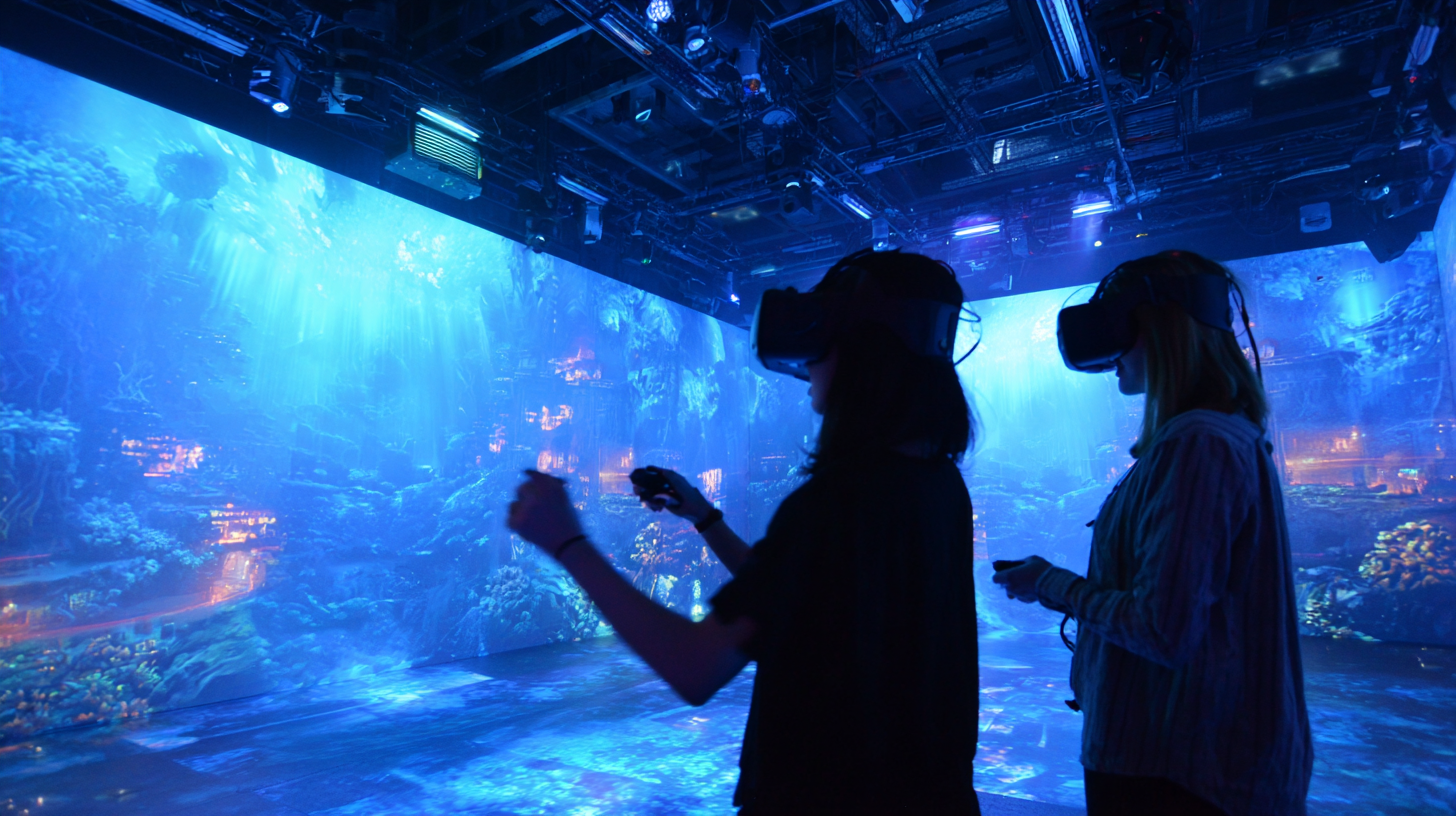Exploring Innovative Alternatives to Traditional Entertainment with VR Parks
Table of Contents
- The Rise of VR Parks: Transforming the Entertainment Landscape
- Why VR Parks Are the Future of Immersive Experiences
- The Benefits of Engaging with VR Parks Over Traditional Venues
- How VR Technology Enhances Social Interaction in Entertainment
- Exploring the Diverse Range of Experiences Offered by VR Parks
- The Role of Innovation in Shaping the Future of Entertainment Spaces
- FAQS
- Conclusion
- Related Posts
In recent years, the rise of VR parks has transformed the landscape of entertainment, offering immersive experiences that challenge traditional forms of amusement. As technology evolves, companies like Guangzhou Longcheng Electronic Co., Ltd., VART VR, one of China's earliest VR simulator manufacturers, are at the forefront of this innovative shift. With a commitment to providing one-stop VR and cinema projects and a strong foundation built on over 8000 square meters of cutting-edge facilities and a dedicated team of over 60 staff, VART VR is poised to lead the charge in creating captivating VR parks. This blog will delve into the problems associated with conventional entertainment, such as limited engagement and accessibility, while exploring how VR parks offer groundbreaking alternatives that promise to redefine the way we experience leisure and enjoyment.

The Rise of VR Parks: Transforming the Entertainment Landscape
The rise of VR parks is redefining the entertainment landscape, providing immersive experiences that traditional venues cannot match. According to a report by MarketsandMarkets, the virtual reality market is projected to reach $57.55 billion by 2027, growing at a CAGR of 44.5%. This rapid expansion signals a significant shift in consumer preferences towards interactive and engaging entertainment alternatives. VR parks are capitalizing on this trend by offering unique, multi-sensory experiences that transport guests into fantastical worlds, effectively tapping into the burgeoning demand for more dynamic entertainment.
As consumers increasingly seek novel experiences, VR parks have emerged as a compelling solution for both social and solo entertainment. Research conducted by IBISWorld indicates that the global amusement parks industry, which has historically been dominated by traditional offerings, is expected to grow significantly as VR parks proliferate. With the integration of cutting-edge technologies like motion capture and haptic feedback, these parks are not only captivating visitors but also fostering a new wave of social interaction among players. As VR technology continues to advance, we can expect these parks to revolutionize how we perceive and engage with entertainment.
Why VR Parks Are the Future of Immersive Experiences
As we delve into the future of entertainment, VR parks emerge as a groundbreaking alternative to traditional amusement venues. These immersive experiences transport visitors into virtual worlds where they can engage in activities that challenge the bounds of reality. Unlike conventional parks that offer static rides and experiences, VR parks leverage cutting-edge technology to create dynamic environments tailored to diverse interests. This innovation not only enhances the thrill of exploration but also allows for limitless creativity in experience design, ranging from fantastical landscapes to thrilling adventures in space or ancient civilizations.
Moreover, the adaptability of VR parks makes them appealing to a broad audience. Families, teenagers, and even corporate groups can find something that resonates with their preferences. This flexibility promotes social interaction and collaboration in ways that traditional entertainment typically cannot. By fostering a sense of connection and shared experience among participants, VR parks are redefining the concept of fun. As these venues continue to evolve, they hold the potential to offer a rich tapestry of experiences that reimagine entertainment for future generations, establishing them as a cornerstone of the leisure industry.
The Benefits of Engaging with VR Parks Over Traditional Venues
Virtual Reality (VR) parks are revolutionizing the way we experience entertainment, offering a dynamic alternative to traditional venues. One of the most significant benefits of engaging with VR parks is their ability to create immersive environments tailored to individual preferences. Unlike conventional amusement parks that often rely on standard rides and attractions, VR parks provide users with unique experiences that can be continuously updated. This level of customization not only keeps the entertainment fresh but also allows visitors to explore diverse worlds and scenarios from the comfort of their seats.
 Moreover, VR parks promote social interaction in innovative ways. Many experiences can be enjoyed in groups, fostering collaboration and friendly competition among participants. This aspect of shared engagement enhances the overall enjoyment, as friends and family can embark on thrilling adventures together, bridging the gap between the digital and physical worlds. Additionally, the accessibility of VR technology makes it possible for people of all ages and abilities to participate, widening the audience and ensuring that entertainment is inclusive and engaging for everyone.
Moreover, VR parks promote social interaction in innovative ways. Many experiences can be enjoyed in groups, fostering collaboration and friendly competition among participants. This aspect of shared engagement enhances the overall enjoyment, as friends and family can embark on thrilling adventures together, bridging the gap between the digital and physical worlds. Additionally, the accessibility of VR technology makes it possible for people of all ages and abilities to participate, widening the audience and ensuring that entertainment is inclusive and engaging for everyone.
How VR Technology Enhances Social Interaction in Entertainment
Virtual Reality (VR) technology is increasingly revolutionizing the entertainment landscape, enhancing social interaction in ways traditional mediums cannot. According to a report by PwC, the VR and AR market in entertainment is expected to reach $1 trillion by 2030, driven primarily by immersive experiences that foster social connectivity among users. In VR parks, people can engage in unique environments where they collaborate or compete in games, fostering a sense of community and shared experiences that is often lacking in traditional venues.
Moreover, VR technology promotes engagement through its ability to create realistic social settings. A study by the International Data Corporation (IDC) suggests that 65% of VR users report feeling more socialized in virtual spaces compared to physical ones. This is particularly significant in post-pandemic society, where many are eager for safe avenues for social interaction. VR parks provide not just a platform for individual gaming but also a collaborative space where users can form connections, thereby enhancing the overall entertainment experience. As the technology continues to evolve, it will likely lead to even more innovative ways to engage audiences and reshape interactions in the entertainment industry.
Exploring Innovative Alternatives to Traditional Entertainment with VR Parks
| Dimension | VR Parks | Traditional Entertainment | Advantages of VR |
|---|---|---|---|
| Social Interaction | High level of interactivity with other users | Limited to physical space and audience | Enhanced engagement and collaboration |
| Immersive Experience | Fully immersive 3D environments | 2D experiences with limited interactivity | Stronger emotional connection with content |
| Location Accessibility | Accessible from anywhere with VR gear | Requires physical attendance | Wider audience reach without geographical limits |
| Cost | Varying upfront investment in technology | Costly in terms of venue and production | Potential for lower operational costs over time |
| Customization | Highly customizable environments and experiences | Limited customization options | Ability to tailor experiences to user preferences |
Exploring the Diverse Range of Experiences Offered by VR Parks
Virtual Reality (VR) parks are rapidly transforming the entertainment landscape by offering a diverse array of immersive experiences that go beyond traditional amusement options. According to a report from Statista, the global virtual reality market is expected to reach $62.1 billion by 2027, indicating a growing appetite for innovative entertainment solutions. VR parks leverage this enthusiasm by providing multi-sensory environments where visitors can engage in everything from thrilling roller coaster simulations to serene nature escapes, all facilitated by cutting-edge technology.
These parks cater to a wide demographic, from families looking for novel outings to tech enthusiasts seeking advanced gaming experiences. In a recent survey by IBISWorld, it was reported that 78% of participants expressed a willingness to try VR attractions, with 67% indicating they would return for repeat visits. Experiences such as VR escape rooms and multiplayer interactive adventures not only enhance social interaction but also create lasting memories, making VR parks a compelling alternative to traditional entertainment venues. As the technology continues to evolve, the potential for diverse experiences will only expand, captivating an increasingly eclectic audience.

The Role of Innovation in Shaping the Future of Entertainment Spaces
Innovative alternatives to traditional entertainment are rapidly gaining ground, particularly in the realm of VR parks. As the demand for immersive experiences rises, the role of innovation in shaping the future of entertainment spaces cannot be overstated. Reports show that the global VR market for entertainment is projected to reach approximately $45 billion by 2028, highlighting the significant impact of technological advancements in this sector. With the support of various stakeholders, VR parks are integrating cutting-edge technology to transform how audiences engage with entertainment.
Tips: When considering a visit to a VR park, look for locations that offer diverse experiences combining gaming, storytelling, and interactive environments. Engaging with multiple attractions can enhance your overall experience and help you appreciate the full breadth of what VR technology can offer.
Moreover, the rise of oversized VR installations—capitalizing on expansive spaces—affords users unparalleled immersion that distinctively sets them apart from conventional leisure activities. Government initiatives to promote VR within the cultural and tourism sectors further emphasize the potential for growth in this field. As these innovations break down traditional boundaries, we can anticipate a future where entertainment spaces are more interconnected and experience-driven than ever before.
Tips: Exploring different VR parks can reveal unique themes and experiences, so don't hesitate to try a few to find your favorite. Engaging with community feedback on platforms can also guide you to the best locations that suit your interests.
FAQS
: VR parks are entertainment venues that use virtual reality technology to create immersive experiences. Unlike traditional amusement parks that offer static rides, VR parks provide dynamic environments where visitors can engage in interactive activities that challenge the bounds of reality.
The virtual reality market is projected to reach $57.55 billion by 2027, growing at a compound annual growth rate (CAGR) of 44.5%, indicating a significant shift in consumer preferences towards interactive entertainment.
VR parks cater to a broad audience, including families, teenagers, and corporate groups, offering a range of experiences that promote social interaction and collaboration among participants.
Visitors can engage in a variety of experiences, including thrilling roller coaster simulations, serene nature escapes, VR escape rooms, and multiplayer interactive adventures, all enabled by cutting-edge technology.
By offering shared experiences and collaborative activities, VR parks promote social interaction in ways that traditional entertainment venues typically cannot, allowing participants to connect more deeply through their adventures.
Yes, a survey reported that 67% of participants indicated they would return for repeat visits, highlighting the engaging nature of the experiences offered at VR parks.
The flexibility of VR parks in offering diverse experiences makes them appealing to different demographic groups, fostering a sense of connection and shared experiences among visitors which traditional venues may lack.
As VR technology continues to advance, VR parks are expected to revolutionize how we perceive and engage with entertainment, potentially establishing themselves as a cornerstone of the leisure industry for future generations.
Consumer preferences are shifting towards interactive and engaging entertainment alternatives, as evidenced by the growing interest and willingness to try VR attractions among a majority of the surveyed participants.
VR parks are expected to significantly grow the global amusement parks industry, historically dominated by traditional offerings, by providing innovative entertainment solutions that meet the evolving desires of consumers.
Conclusion
As the entertainment landscape continues to evolve, VR parks are emerging as a transformative force, offering immersive experiences that surpass traditional venues. These innovative spaces harness cutting-edge VR technology to create engaging and interactive environments, attracting audiences seeking novel entertainment options. The diverse range of experiences available in VR parks enhances social interaction, allowing friends and families to connect in exciting, shared adventures.
Companies like Guangzhou Longcheng Electronic Co., Ltd. VART VR are at the forefront of this revolution, leveraging their expertise in VR simulator manufacturing to pioneer the future of entertainment. With a commitment to innovation and a comprehensive approach to VR project development, they are helping to redefine how people engage with entertainment, making VR parks a key player in shaping the future of leisure activities.
Related Posts
-

Exploring Real World Applications of the Best VR Play Park in Entertainment and Education Industries
-

Addressing Common Issues in VR Airplane Simulators: Solutions for Improved Experiences
-

From China's Leading Factory The Trusted Source for the Best VR Race Game Globally
-

The Definitive Guide to Understanding Vr Machine Price and Its Market Trends
-

Exploring Challenges Faced by Global Buyers in Integrating Vr Mall Cinema Solutions
-

Issues with 9d Vr Simulator Games and Their Impact on User Experience

